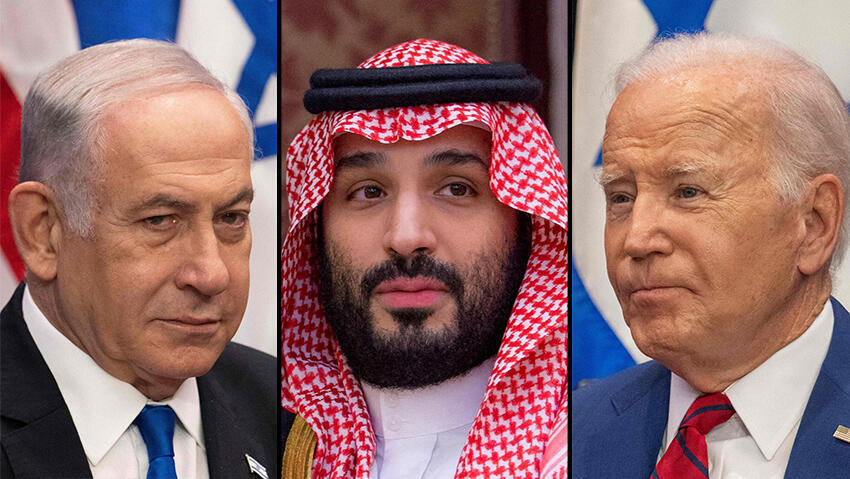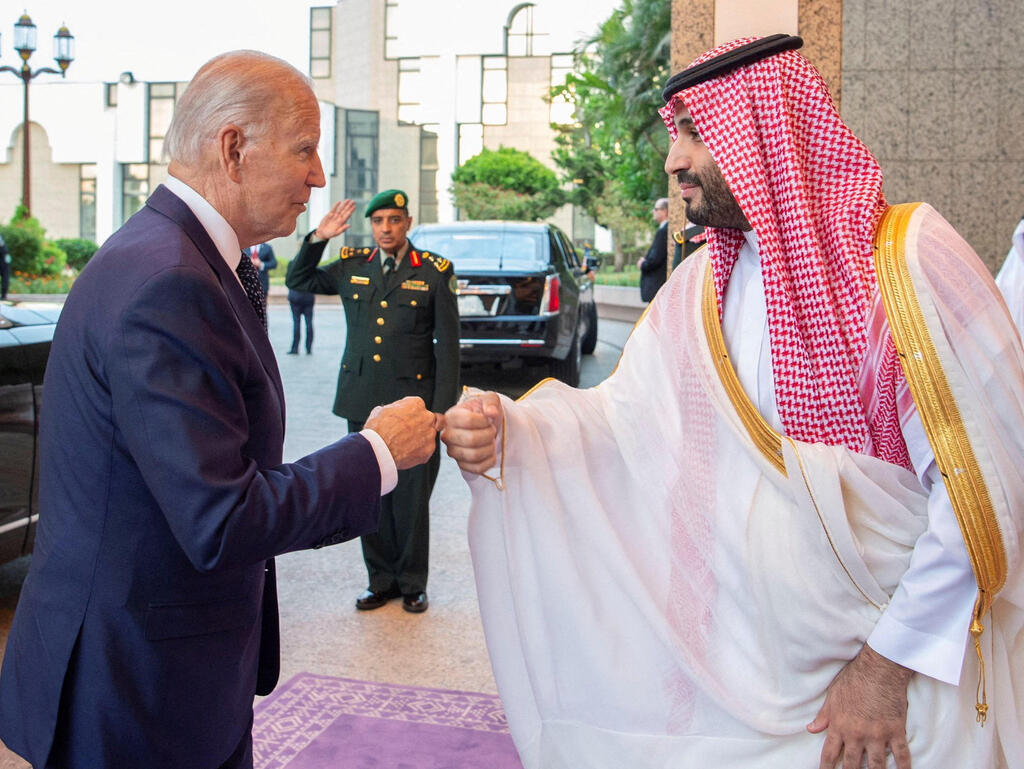Getting your Trinity Audio player ready...
Normalisation of relations between Israel and Saudi Arabia is inevitable. It is already well underway and has been for some years, even if not yet formally and publicly recognised.
More stories:
Many commentators believe that official diplomatic recognition might founder on the Palestinian issue, with Saudi demanding compromises that Israel cannot meet. That is not so. The 2020 Abraham Accords were established without any Israeli concessions to the Palestinians, and they were agreed with the UAE and Bahrain, and later Morocco and Sudan, with complete Saudi backing, albeit behind the scenes.
2 View gallery


Prime Minister Benjamin Netanyahu, Saudi Crown Prince Mohammed bin Salman and US President Joe Biden
(Photo: Ludovic MARIN / POOL / AFP, Bandar Algaloud/Courtesy of Saudi Royal Court/Handout via REUTERS)
That tells you everything about Saudi’s actual perspective on the Palestinian question, notwithstanding public comments such as those of the Saudi ambassador to the Palestinians who said during a recent visit to Ramallah that the Arab Peace Initiative “is a fundamental pillar of any upcoming agreement”.
The 2002 Arab Peace Initiative conditions Arab recognition of Israel on the latter’s withdrawal from Judea and Samaria, Gaza and the Golan Heights, return of refugees and the establishment of a Palestinian state with East Jerusalem as its capital.
The Saudis know better than most that no such thing is possible and I was told as much by officials during meetings in Riyadh a few years ago. They know that not only would Israel be endangering its citizens and its very existence but also that most Palestinians do not want it either: a poll this month by the Palestinian Center for Policy and Survey Research shows that a significant majority oppose the idea of a two-state solution.
Saudi crown prince tells Fox News agreement with Israel is getting closer
(Video: Fox News)
If the Saudis genuinely felt that normalisation was dependent on substantive Israeli concessions to the Palestinians they would not continue to pursue negotiations towards an unachievable goal. We would not have heard Saudi Crown Prince Mohammed bin Salman recently tell Fox News that normalization is getting “closer” every day.
PA leadership know they can do nothing to prevent normalization
But as leader of the Arab and Muslim world, the Kingdom is obliged to show public support for its Palestinian brothers. In reality, it will probably settle for Israeli gestures such as statements of intent and perhaps repudiation of any annexation plans, while restoring significant Saudi funding to the Palestinian Authority. The latter is sorely needed by the PA leadership, who know they can do nothing to prevent normalization anyway if Riyadh decides on it and might as well cash in.
Economic benefits accruing from normalisation are high up on Saudi’s agenda, but its top priority is security and regime stability, upon which all else depends. Here Iran remains Riyadh’s number one concern, despite restoration of diplomatic relations, as well as the continuing threat of overthrow by Islamic jihadists. Memories of the “Arab Spring” have not faded.
On both fronts, Israel can, and has, assisted even without normalisation, and would be in a position to do much more under open diplomatic relations. The real prize, though, is the U.S., from which Saudi is looking for a firm defence treaty, supply of advanced weaponry such as F35 combat planes and ATACMS long-range missiles as well as provision of civil nuclear capabilities. Each of these could be problematic for Israel given its need to maintain military superiority in the region; but, with the necessary safeguards, Jerusalem will accede given the overwhelming strategic benefits of normalization.
The real decider will be the administration in Washington
So is the stage set for normalization between Israel and Saudi as part of a wider agreement with the U.S.? The political challenges in Israel, with divergences in the coalition, especially on even token concessions to the Palestinians, as well as resistance to the nuclear elements from the opposition, should not be underestimated. But the real decider will be the administration in Washington.
MBS knows exactly what he wants and recognises that he currently has a unique opportunity to achieve it. With the growing strength of the China-Iran-Russia axis in the Middle East, the U.S. needs to do all it can to push back, especially against China. Tighter relations with Saudi Arabia, and the Western-facing economic and military projects that will go along with that, are important means to serve U.S. strategic objectives, to some extent a reversal of the Obama pivot away from the Middle East which has so demonstrably failed.
MBS also knows that Biden is desperate for foreign policy success in advance of the election. Even if he doesn’t actually stand in 2024, he still needs a Democratic Party victory — and a legacy for himself. Foreign affairs will not be the determining factor in the presidential race, but it could certainly help tip the balance in a tightly fought contest. Here, a historic peace deal between Saudi Arabia and one of America’s most popular allies, brokered by the president, will have more appeal to ordinary voters than the other strategic advantages, which is the reason normalisation with Israel has been given so much prominence in DC.
There is particular resistance to the idea of a defence pact, under which American soldiers could be sent to defend Saudi Arabia in the event of a war. A treaty would need support from two-thirds of the Senate. That might be a difficult sell
Securing an agreement with Saudi Arabia now is not, however, a foregone conclusion. An administration that started its term by denigrating Saudi Arabia, condemning its crown prince and curtailing military support has helped foment opposition to renewed cooperation among the public and its own party’s lawmakers. There is particular resistance to the idea of a defence pact, under which American soldiers could be sent to defend Saudi Arabia in the event of a war. A treaty would need support from two-thirds of the Senate. That might be a difficult sell but stands more chance of success under a Democratic government than it would in the future if there was a Republican president in the White House.
With sufficient party impetus, most Democratic senators, especially as the election approaches, will support a treaty put forward by Biden, and many Republicans are likely to vote in favour, given the stakes for Israel. The same proposal from a Republican president would be likely to meet strong opposition among Democratic senators.
 Colonel Richard KempPhoto: Courtesy
Colonel Richard KempPhoto: CourtesySo the stars seem to be aligning. Whether Israel will secure the long-sought normalisation, with the tremendous benefits that would bring for both countries and the region as a whole, depends almost totally on political will in Washington. That political will could, however, be undermined by a single rogue factor, and that is the Biden administration’s desire to carve out a place in history as Middle East peacemakers.
As I have said, Saudi understands a two-state solution is not possible. Biden, however, with advisers such as John Kerry, does not understand that and there is little doubt that he is pressing Saudi to demand it. Unless wiser counsels prevail in Washington the unattainable obsessions of the outdated peace processors could yet again frustrate historic progress in the Middle East.
- Colonel Richard Kemp is a former UK Armed Forces commander





